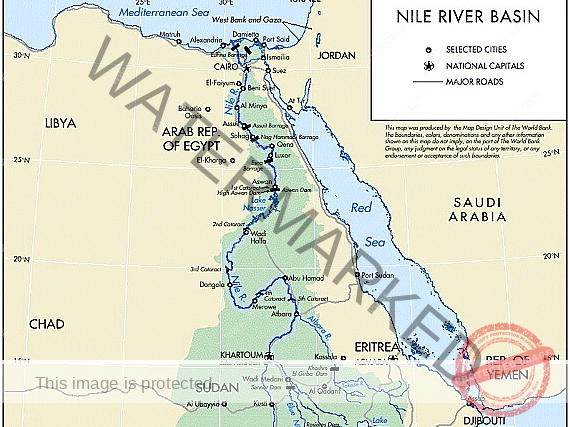By Hichem Karoui
Obviously, there is a problem between Ethiopia, Egypt, and Sudan, and the cause is water. The conflict between these three countries over the Nile River is deeply rooted in historical and geographical factors.
Historically, the dispute is influenced by colonial-era treaties that granted Egypt significant control over the Nile waters, which Ethiopia and other upstream countries were not party to, leading to claims of “historic rights” by Egypt (Lawson, 2017). These treaties have been a source of contention as Ethiopia, with its geographical advantage as the upstream nation, seeks a more equitable distribution of the river’s resources (Ejigu, 2016). The construction of the Grand Ethiopian Renaissance Dam (GERD) has intensified these tensions, as it represents Ethiopia’s assertion of its rights to utilize the Nile for its development, challenging Egypt’s long-standing hydro-hegemony (Ejigu, 2016). Geographically, the Nile River is a critical water source for all three countries, with Egypt and Sudan being highly dependent on its flow for agriculture and water supply. Ethiopia’s position at the river’s source gives it significant leverage, which it has used to alter the power dynamics in the region (Ejigu, 2016). Sudan’s shifting alignment from Egypt to Ethiopia further complicates the geopolitical landscape, as it has historically supported Ethiopia’s stance on the GERD, recognizing the potential benefits of the dam for its own water management and electricity needs (Lawson, 2017) (Ejigu, 2016). Additionally, the unresolved boundary issues between Ethiopia and Sudan, stemming from colonial-era demarcations, add another layer of complexity to the regional dynamics, as these boundaries have not been clearly defined, leading to periodic disputes (Wubneh, 2015). The interplay of these historical treaties, geographical positions, and shifting alliances underscores the multifaceted nature of the conflict, necessitating cooperative solutions to ensure sustainable water management and regional stability (Souza & Jara, 2023) (Ejigu, 2016).
The Grand Ethiopian Renaissance Dam
The GERD is a massive hydroelectric dam project on the Blue Nile River in Ethiopia. It’s one of the largest infrastructure projects in Africa and has been under construction since 2011. The primary purposes of the dam are:
To generate electricity for Ethiopia’s growing population and economy
To provide water for irrigation
To control flooding in downstream countries. (Matthews & Vivoda, 2023, pp. 333–366; Odidi & Oyoo, 2021)
The main problems raised by the GERD
a) Water security concerns:
Egypt relies heavily on the Nile River for its water supply, with about 95% of its freshwater coming from the Nile.
There are fears that the dam could significantly reduce the amount of water flowing to Egypt, especially during the filling period of the dam’s reservoir. (Matthews & Vivoda, 2023, pp. 333–366; Odidi & Oyoo, 2021)
b) Agricultural impact:
Both Egypt and Sudan depend on the Nile for agriculture.
A reduction in water flow could affect crop yields and food security in these countries. (Odidi & Oyoo, 2021)
c) Environmental concerns:
Changes in water flow could impact the Nile’s ecosystem and biodiversity.
There are concerns about potential changes in sedimentation patterns, which could affect soil fertility in downstream areas. (Borji, 2013; Odidi & Oyoo, 2021)
d) Economic implications:
Egypt’s concerns extend to potential economic impacts, including effects on hydroelectric power generation at its own Aswan High Dam. (Matthews & Vivoda, 2023, pp. 333–366; Odidi & Oyoo, 2021)
e) Geopolitical tensions:
The GERD has become a source of diplomatic tension between Ethiopia, Egypt, and Sudan.
There are disagreements over water rights and the management of the dam’s filling and operation. (Matthews & Vivoda, 2023, pp. 333–366; Odidi & Oyoo, 2021; Quagliarotti, 2023)
Current state of negotiations
The construction and operation of the GERD have led to ongoing negotiations and tensions between Ethiopia, Egypt, and Sudan:
Ethiopia views the dam as crucial for its development and argues that it has the right to utilize its natural resources.
Egypt sees the dam as an existential threat to its water security.
Sudan has a more complex position, seeing both potential benefits (flood control) and risks (impact on its own dams).
Negotiations have been ongoing for years, involving various international mediators, including the African Union, the United States, and the United Nations. However, a comprehensive agreement has not yet been reached. (Matthews & Vivoda, 2023, pp. 333–366; Odidi & Oyoo, 2021; Quagliarotti, 2023)
Is the region headed toward war?
While tensions are high, it’s important to note that as of now, the situation has not escalated to war. However, there are concerns about the potential for conflict:
a) Rhetoric:
There have been instances of strong rhetoric from all sides, particularly between Egypt and Ethiopia.
Some Egyptian officials have previously hinted at military action as a last resort, though this is generally seen as diplomatic posturing. (İlkbahar & Mercan, 2023; Matthews & Vivoda, 2023, pp. 333–366)
b) Diplomatic efforts:
Despite tensions, all parties have engaged in diplomatic negotiations, showing a willingness to find a peaceful solution.
International bodies like the African Union have been actively involved in mediating the dispute. (Matthews & Vivoda, 2023, pp. 333–366; Odidi & Oyoo, 2021; Quagliarotti, 2023)
c) Mutual interests:
All countries involved have strong incentives to avoid war, given the potentially devastating consequences for the entire region. (Matthews & Vivoda, 2023, pp. 333–366; Odidi & Oyoo, 2021)
d) International pressure:
The international community has been urging a peaceful resolution, which adds pressure on all parties to avoid military confrontation. (Matthews & Vivoda, 2023, pp. 333–366; Odidi & Oyoo, 2021; Quagliarotti, 2023)
Conclusion
The main problem raised by the Ethiopian Renaissance Dam (GERD) today is the potential reduction in water flow to downstream countries, particularly Egypt and Sudan. This raises concerns about these nations’ water security, agricultural productivity, environmental impacts, and economic implications. The situation has created significant diplomatic tensions between Ethiopia, Egypt, and Sudan.
While the rhetoric has been strong at times, and there are concerns about potential conflict, it would be premature to conclude that the region is definitively headed toward war. Diplomatic efforts are ongoing, and there are strong incentives for all parties to find a peaceful resolution. However, the situation remains delicate and requires careful management and continued international mediation to prevent escalation into armed conflict.
References
Matthews, Ron, and Vlado Vivoda. “‘Water Wars’: Strategic Implications of the Grand Ethiopian Renaissance Dam.” Conflict, Security & Development 23 (2023): 333–66.
Odidi, S., & Oyoo, R. O. (2021). Hydropolitics of the Grand Ethiopian Renaissance Dam (GERD): Appraising the Socio-Economic and Security Implications. International Journal of Scientific and Research Publications (IJSRP).
Borji, Tadesse Tufa. “Sedimentation and Sustainability of Hydropower Reservoirs: Cases of Grand Ethiopian Renaissance Dam on the Blue Nile River in Ethiopia,” 2013.
Quagliarotti, D. (2023). Will the Nile River Turn into a Lake? The Grand Ethiopian Renaissance (GERD) Dam Case-Study. Global Environment.
Matthews, Ron, and Vlado Vivoda. “‘Water Wars’: Strategic Implications of the Grand Ethiopian Renaissance Dam.” Conflict, Security & Development 23 (2023): 333–66.



MOST COMMENTED
Book Release / The Mediterranean Notebooks
Far-Right Politics in Israel: How Conflict Shapes the Political Discourse
Nos livres
La sociologie des relations internationales: Pouvoir, culture et changement
Uncategorized
The Sociology Of International Relations: Power, Culture, And Change
Diplomacy / Economy / GEW Intelligence Unit / International Affairs / International Relations / Our Books
From Partners to Rivals? The Evolving Dynamics Of America And Europe
Bonnes feuilles / Nos livres
De partenaires à rivaux? La dynamique évolutive de l’Amérique et de l’Europe
Book Release / GEW Humanities' Group / World Literature
Le Dieu de beaucoup de choses: La vie et l’œuvre d’Arundhati Roy
Our Books / World Literature
The God Of Many Things: The Life And Works Of Arundhati Roy